Unit 7 Summer holiday plans(第1课时)课件(16张PPT)
文档属性
| 名称 | Unit 7 Summer holiday plans(第1课时)课件(16张PPT) |
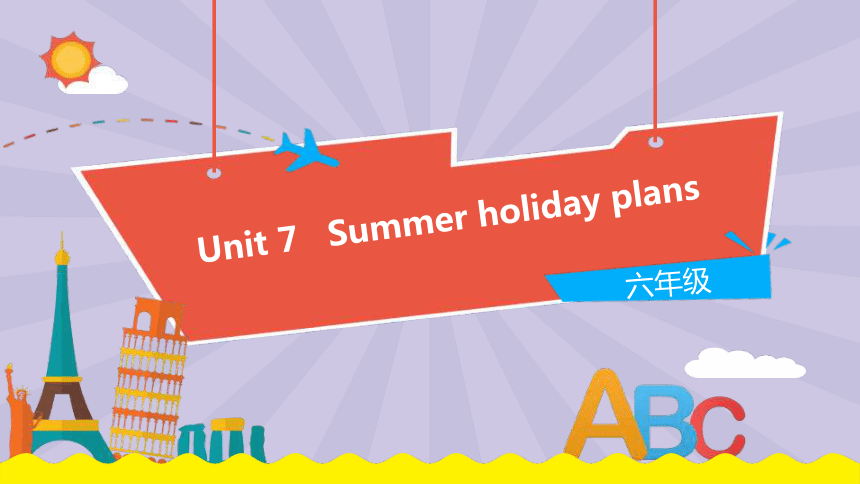
|
|
| 格式 | zip | ||
| 文件大小 | 6.0MB | ||
| 资源类型 | 教案 | ||
| 版本资源 | 牛津译林版 | ||
| 科目 | 英语 | ||
| 更新时间 | 2020-03-25 00:00:00 | ||
图片预览

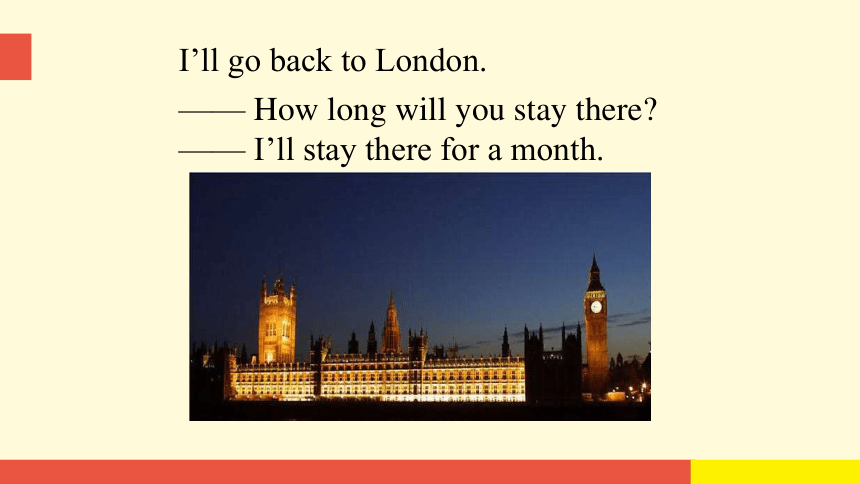
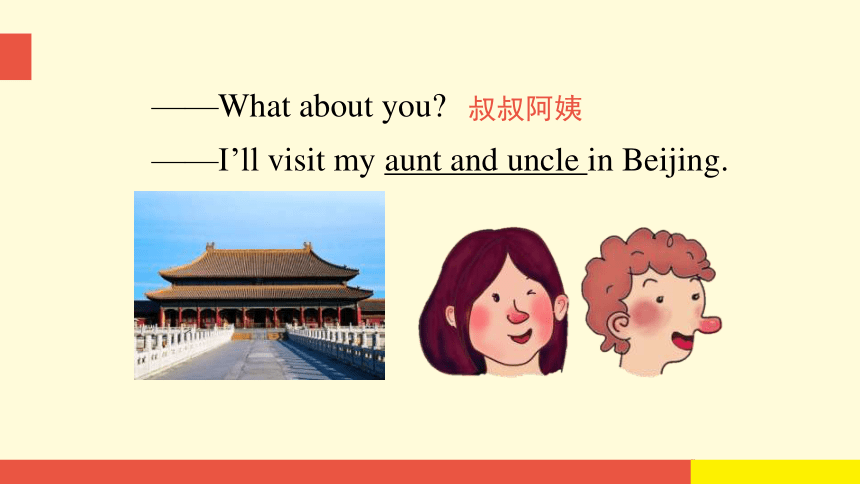
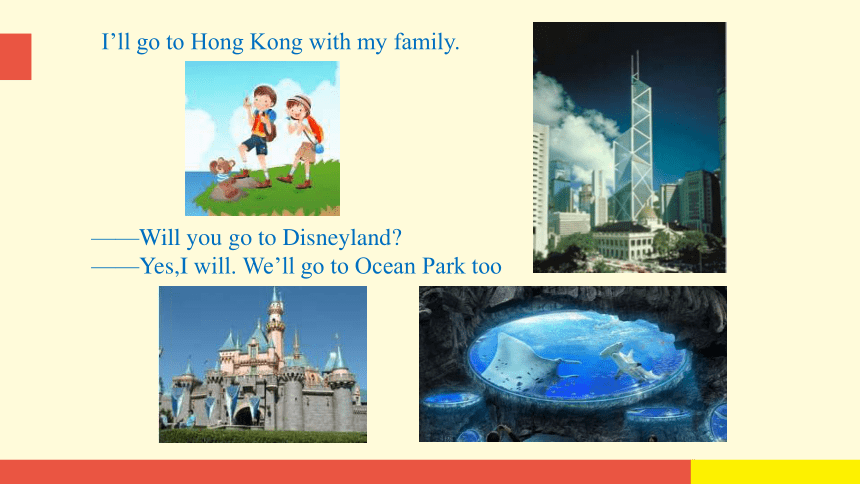
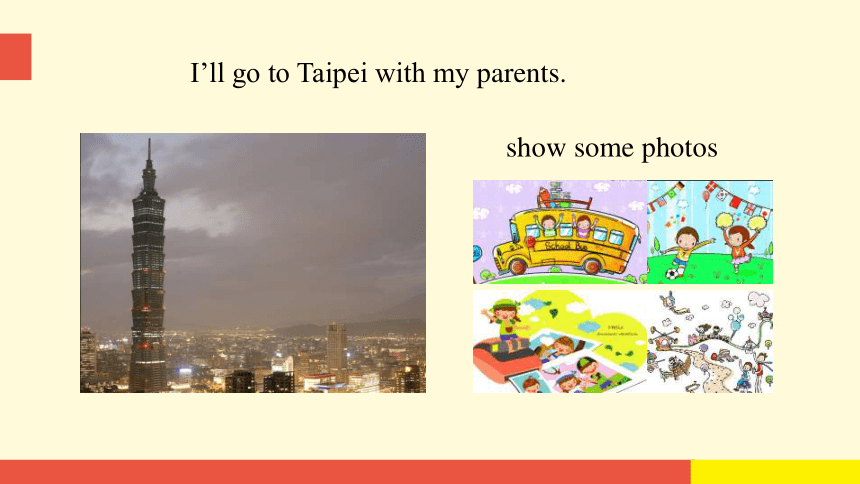

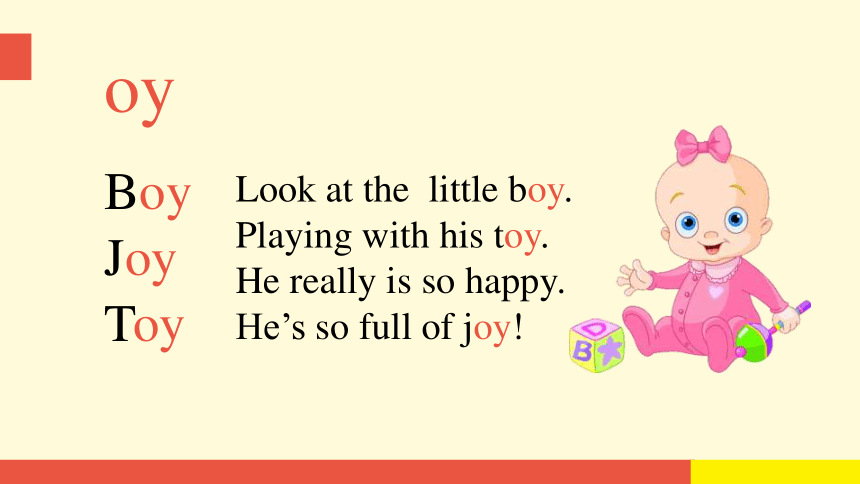
文档简介
课件16张PPT。Unit 7 Summer holiday plans六年级I’ll go back to London.—— How long will you stay there?
—— I’ll stay there for a month.——What about you?——I’ll visit my aunt and uncle in Beijing.叔叔阿姨I’ll go to Hong Kong with my family.——Will you go to Disneyland?
——Yes,I will. We’ll go to Ocean Park tooI’ll go to Taipei with my parents.show some photosexciting skioyBoy
Joy
Toy
Look at the little boy.
Playing with his toy.
He really is so happy.
He’s so full of joy! 总结句式结构1.肯定句式。一般将来时的肯定句式由“be going to+动词原形”构成。be在不同的人称形式下,其形式也是不同的:主语是第一人称单数用am,第二人称单数用are,第三人称单数用is,其余情况下均用are。如:We are going to visit Guiyang.
我们要去参观贵阳。2.否定句式。一般将来时的否定句式由“be not going to+动词原形”构成。be在不同的人称形式下,变化与在肯定句式下相似。如:We are not going to stay with him.我们并不是要赶上他。Tip:
When you read, pay attention to(注意) the intonation(语调).3.疑问句式。一般将来时的疑问句式把be放于句首,由“Be+主语+going to+动词原形+其他?”构成,be在不同的人称形式下,变化与在肯定句式下相似。如: Is he going to talk with her teacher?他打算和她的老师交谈吗?Tip:
When you read, pay attention to(注意) the intonation(语调). 一般将来时 形式一、用will或shall表示。“助动词will或shall+动词原形”这一形式,表示将来发生的事情,用于征求对方的意见或表示客气的邀请。如: 1. Tomorrow will be Sunday. 明天就是星期天。 2. The rain will stop soon. 雨很快就要停了。 3. Shall we go there at five? 我们五点钟去那儿,好吗? 4. Will you please open the door? 请你把门打开,好吗? Tip:
When you read, pay attention to(注意) the intonation(语调).二、用be going to结构表示。“be going to+动词原形”用来表示近期或事先考虑过的将要发生的动作以及已有迹象表明必将发生某事,意为“打算”。例如:1. We're going to meet outside the school gate. 我们打算在校门口见面。 2. Look! It's going to rain.
瞧!快下雨了。 三、用现在进行时表示。表示位置转移的动词(如:go, come, leave, start, arrive等),可用现在进行时表示将来时。如: 1. Uncle Wang is coming. 王叔叔就要来了。 2. They're leaving for Beijing. 他们即将前往北京。 四、用一般现在时表示。根据规定或时间表预计要发生的动作,在时间和条件状语从句中,都可用一般现在时表示将来时。如: The new term starts (begins) on August 29th.
新学期八月二十九日开学。 If it doesn't rain tomorrow, we will go out for a picnic.
如果明天不下雨,我们将出去
野餐。 五、用“be+动词不定式”或用“be about to +动词原形”的结构表示。如: 1. He is to visit Japan next year. 明年他将访问日本。 2. They're about to leave. (=They're leaving.) 他们就要走了。
—— I’ll stay there for a month.——What about you?——I’ll visit my aunt and uncle in Beijing.叔叔阿姨I’ll go to Hong Kong with my family.——Will you go to Disneyland?
——Yes,I will. We’ll go to Ocean Park tooI’ll go to Taipei with my parents.show some photosexciting skioyBoy
Joy
Toy
Look at the little boy.
Playing with his toy.
He really is so happy.
He’s so full of joy! 总结句式结构1.肯定句式。一般将来时的肯定句式由“be going to+动词原形”构成。be在不同的人称形式下,其形式也是不同的:主语是第一人称单数用am,第二人称单数用are,第三人称单数用is,其余情况下均用are。如:We are going to visit Guiyang.
我们要去参观贵阳。2.否定句式。一般将来时的否定句式由“be not going to+动词原形”构成。be在不同的人称形式下,变化与在肯定句式下相似。如:We are not going to stay with him.我们并不是要赶上他。Tip:
When you read, pay attention to(注意) the intonation(语调).3.疑问句式。一般将来时的疑问句式把be放于句首,由“Be+主语+going to+动词原形+其他?”构成,be在不同的人称形式下,变化与在肯定句式下相似。如: Is he going to talk with her teacher?他打算和她的老师交谈吗?Tip:
When you read, pay attention to(注意) the intonation(语调). 一般将来时 形式一、用will或shall表示。“助动词will或shall+动词原形”这一形式,表示将来发生的事情,用于征求对方的意见或表示客气的邀请。如: 1. Tomorrow will be Sunday. 明天就是星期天。 2. The rain will stop soon. 雨很快就要停了。 3. Shall we go there at five? 我们五点钟去那儿,好吗? 4. Will you please open the door? 请你把门打开,好吗? Tip:
When you read, pay attention to(注意) the intonation(语调).二、用be going to结构表示。“be going to+动词原形”用来表示近期或事先考虑过的将要发生的动作以及已有迹象表明必将发生某事,意为“打算”。例如:1. We're going to meet outside the school gate. 我们打算在校门口见面。 2. Look! It's going to rain.
瞧!快下雨了。 三、用现在进行时表示。表示位置转移的动词(如:go, come, leave, start, arrive等),可用现在进行时表示将来时。如: 1. Uncle Wang is coming. 王叔叔就要来了。 2. They're leaving for Beijing. 他们即将前往北京。 四、用一般现在时表示。根据规定或时间表预计要发生的动作,在时间和条件状语从句中,都可用一般现在时表示将来时。如: The new term starts (begins) on August 29th.
新学期八月二十九日开学。 If it doesn't rain tomorrow, we will go out for a picnic.
如果明天不下雨,我们将出去
野餐。 五、用“be+动词不定式”或用“be about to +动词原形”的结构表示。如: 1. He is to visit Japan next year. 明年他将访问日本。 2. They're about to leave. (=They're leaving.) 他们就要走了。
